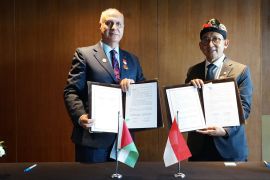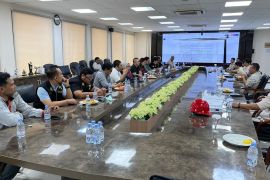The MGI`s prediction was echoed by Raoul Oberman, currently director (emeritus) of McKinsey & Company Indonesia, in a seminar held in Jakarta on November 13, 2012.
Of course, Oberman had his own argumentative perspectives when saying that Indonesia would become the world`s seventh economic power in 2030.
However, this optimistic view on Indonesia`s future cannot just be accepted as it is because, as often written on the advertisements of products, there will be conditions applied that we should meet in order to enable us to gain the expected future.
Therefore, whether or not the MGI`s prediction will come true definitely depends on the Indonesians themselves. The central and regional governments need to work together with all stakeholders of the nation to make Indonesia be a developed country in 2030.
To enable it to gain its new status as a developed country as the MGI predicted, all hurdles that potentially prevent it from reaching the goal should be coped with properly.
One of the conditions that Indonesia should fulfill is closely related to the quality of its human resources.
Thus, whoever wins next year`s presidential election and becomes top leader of the country, there will be a challenging condition that he must face.
The winning leader has no choice but, along with his deputy and all state bureaucracies, must work hard to make majority of society members across the archipelago emerge as well educated and skilled people.
With the high quality human resources, Indonesia`s economy can be expected to grow highly and steadily enough so that development programs can be boosted in all sectors by using its own financial capability instead of internal and external debts.
The United Nations Population Fund (UNPF) has warned all countries of a condition that they must meet if they want to get developed sustainably.
As revealed in its official website (https://www.unfpa.org/demographic-dividend), the UNPF argues that "Sustainable development cannot be achieved without assuring that all women and men, and girls and boys, enjoy the dignity and human rights".
By enjoying the dignity and human rights, the people will be able to "expand their capabilities, secure their reproductive health and rights, find decent work, and contribute to economic growth".
Referring to the real condition of Indonesia`s human resources compared to that of many other emerging countries in Southeast Asia and beyond, we need to be cautious with it and its implications on Indonesia`s future.
The implications may even get worse than expected if the government fails to quickly improve the quality of its human resources.
Instead of emerging as a developed nation in 2030, Indonesia may become a weak state in which its huge population will just become a burden because the government must feed each of its citizens and meet their basic human rights.
Indonesia, indeed, has immense potential to make the MGI`s prediction come true thanks to its huge number of working-age population. But, like a double-edged sword, the working-age population can be a serious burden instead of becoming a demographic bonus.
The demographic dividend can merely be gained by Indonesia if its greater number of youths are healthy as well as well educated and trained to enable them to expend their capabilities, and to contribute the country`s economic development.
"Countries with the greatest demographic opportunity for development are those entering a period in which the working-age population has good health, quality education, decent employment and a lower proportion of young dependents," the UNPF revealed.
As the world`s fourth most populous country, Indonesia has yet to be able to put itself into the list of the world`s most literate nations.
John W.Miller`s study (CCSU, 2016) shows that the top 10 most literate nations are Finland, Norway, Iceland, Denmark, Sweden, Switzerland, the United States of America, Germany, Latvia, and the Netherlands.
The study of Miller, noted researcher of the Central Connecticut State University, further revealed that Indonesia ranked 60th out of 61 countries. Its rank was just better than that of Botswana but it was far left behind by Singapore (36) and Malaysia (53).
His study synthesized "literacy achievement tests (Progress in International Reading Literacy Study and Programme for International Student Assessment) and literate behavior characteristics (population, newspapers, libraries, years of schooling)" (2016).
Miller argued that a nation`s literate behaviors contribute to its success and failure in dealing with the demands of the world`s knowledge-based economics.
Has Indonesia been on the right track to realize the MGI`s prediction? This is a question that needs to keep raising to the government and stakeholders in the country.
Editing by Fardah Assegaf
Reporter: Rahmad Nasution
Editor: Heru Purwanto
Copyright © ANTARA 2018












